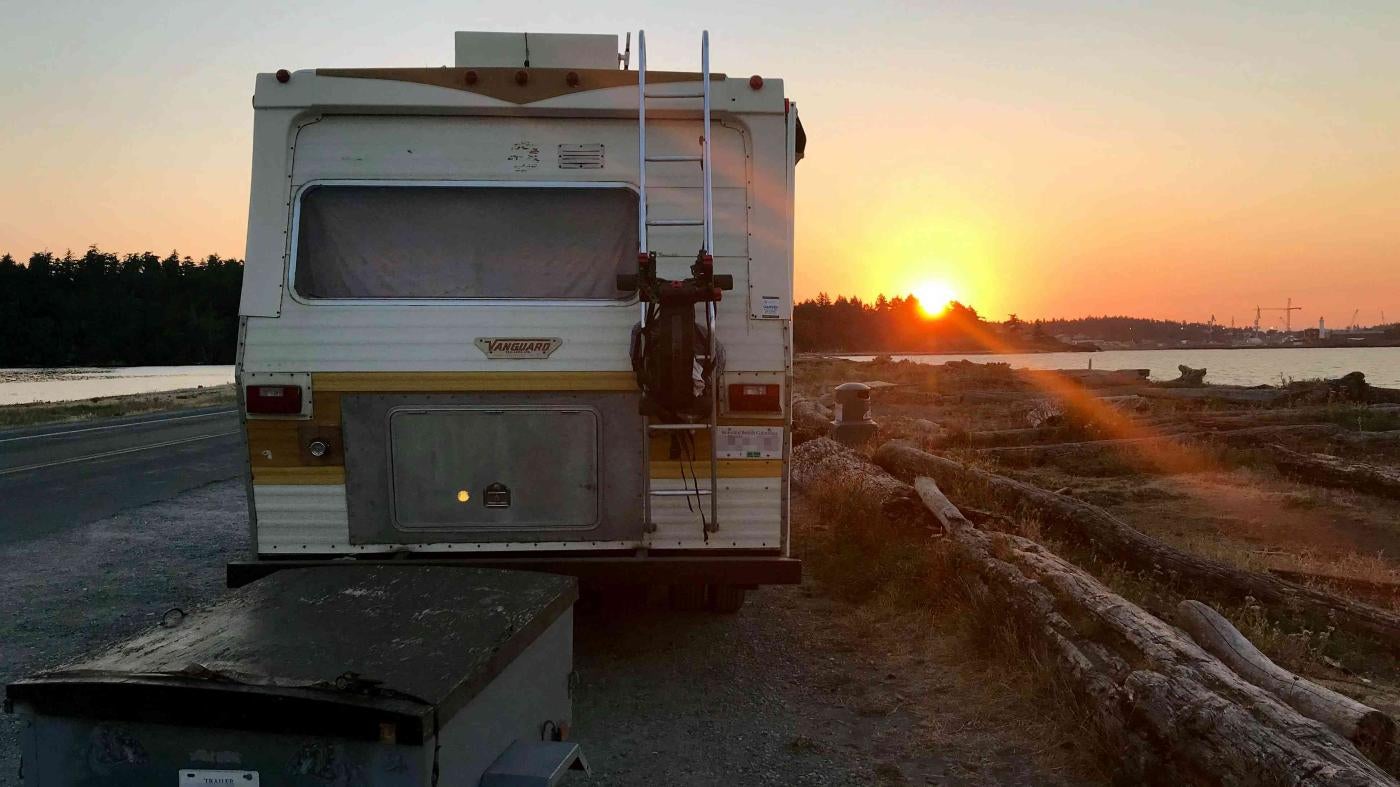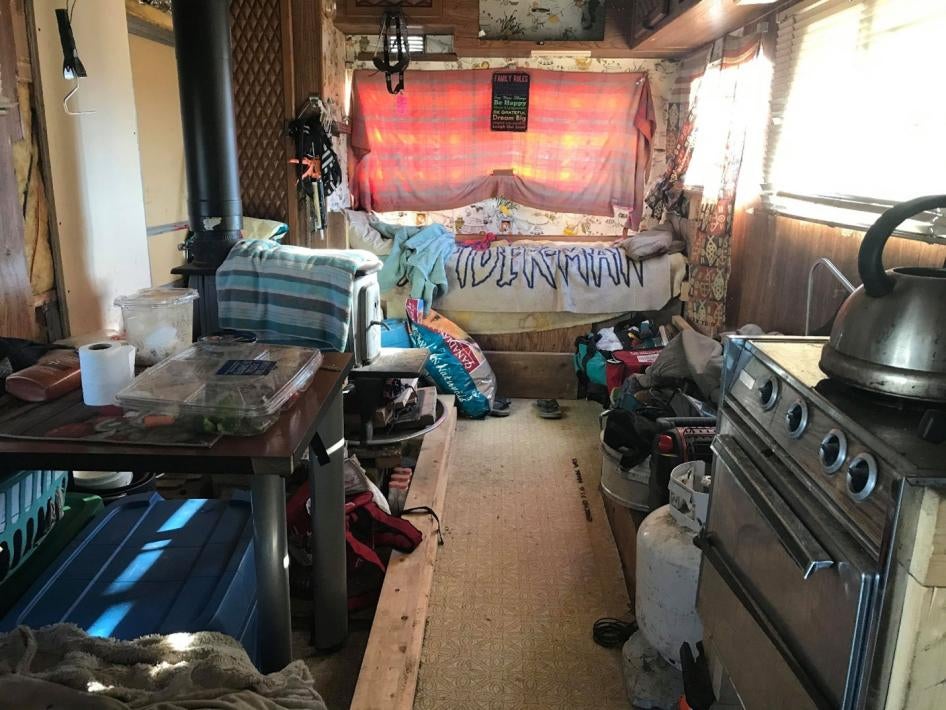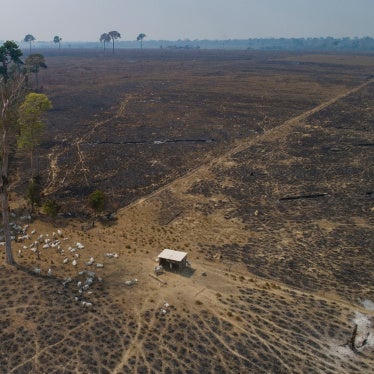Edward Macarthur: Being Unhoused with Disabilities During a Heatwave
Edward Macarthur, 54, lives in Golden, British Columbia, in the Canadian Rocky Mountains. Edward is unhoused. He lives alone out of a camper van with his two dogs, Sasha and Tia, who was the runt of the litter. After he was hit by a drunk driver in 2014, Tia became Edward’s service dog. “I would sacrifice my own life to save my dogs,” he says.
Edward is a spinal cord and traumatic brain injury survivor, and he uses a cane to walk. He also has mental health conditions, including post-traumatic stress (PTSD), post-concussion syndrome, and Tourette syndrome, that he acquired following the injury.
Edward has been living in his camper van for five years. The van has no water or toilet, let alone a cooling device. When the heatwave hit the area in June, the heat inside the camper was unbearable and Edward feared for his life. And finding another place to live was a challenge. Edward receives only CAD$375 for housing, which he says is not enough to afford a decent home. Additionally, few properties are pet friendly.
The extreme heat was particularly debilitating for Edward, as his injury-related conditions had an impact on his body’s ability to regulate temperature and he had trouble breathing. People with spinal cord and traumatic brain injuries can be at higher risk of heat-related illnesses because of limited capacity to sweat, the body’s primary way of cooling down.
Unable to find help or shelter in Golden, Edward decided to evacuate. He drove through forest fires for 12 hours to reach the coast, thinking the sea breeze might help him and his dogs keep cool. But authorities use bylaws to stop people from camping in certain areas, like the beach, which prevents unhoused people like Edward from finding safety in coastal towns during a heatwave. Police threatened to ticket and tow his van, throwing him and his dogs on the street. He pleaded and explained his condition, but they still insisted he leave. Without other options, Edward drove back to Golden, where friends he made through Facebook sometimes give him food and water.
Even as the heatwave eventually subsided, Edward felt isolated and at risk. But he suggested some solutions. One easy improvement, he said, would be to classify air conditioning units as a medical device, so people could apply for a cooling device to be distributed to them to control their personal environment. But the biggest of all, he says, is that the government should tackle the poverty experienced by many people with disabilities in Canada.
Paul Caune: Advocating for Disability Rights, Isolated at Home
“This summer … in British Columbia, it was the highest temperature I’ve ever remembered, and I have lived here since 1968.” When Paul Caune’s sister gave him a portable air conditioner in 2018, he said it was a miracle in helping him deal with the heat. But it wasn’t enough during the June heatwave. Paul is the Executive Director of a nonprofit, Civil Rights Now, advocating for the rights of people with disabilities. Paul has spent years living in group homes and long-term facilities for people with disabilities, and he has been advocating for the right to live independently in the community for 14 years now.
Paul, who has muscular dystrophy and uses a wheelchair and a ventilator to help him breathe, now lives in a subsidized apartment in Vancouver. His one-bedroom apartment is on the top floor and faces sun in the morning. The ventilation in his apartment is ok, he says, but his bedroom and the building’s hallways get very hot, especially during heatwaves. There is no air conditioning in the building apart from the portable AC unit in his apartment.
It’s not easy for Paul to travel, especially during extreme heat, when leaving the house means he would be exposing himself to direct sunlight and outdoor heat.
Additionally, because he is at increased risk of serious complications if he were to contract Covid-19 due to underlying medical conditions, Paul has been isolated at home for over a year. The only people he sees are the personal assistants he needs to come visit him. But during the heatwave, many weren’t showing up for work. On the hottest night, he says, “I had a worker come at 10 p.m. to put me to bed. That night they had sent me a worker I had already previously asked not to be sent to me, as I didn’t feel safe with him.” Paul rejected the assistance of the worker with whom he didn’t feel safe, and was afraid he would have to spend the whole night in his wheelchair. Thankfully he was able to get two other workers to help him go to bed.
The heat leaves Paul feeling anxious, overwhelmed, and in serious physical discomfort. In the summer, the heat causes more irritation in his lungs. His feet also swell, causing his legs to hurt. At one point during this past summer’s heatwave, the pain almost forced him to call an ambulance. But his mistrust in health services after prior bad experiences with hospitals stopped him from doing so.
His lack of trust in the healthcare system and the struggles he has faced with his personal assistance make Paul feel angry and depressed, but also scared, “like the whole system is collapsing,” he says. Paul’s heat-related distress can be overwhelming and the temperature of most summer days, let alone this past summer’s heatwave, can make it unbearable. After the heatwave passed in July, Paul got a new, stronger air conditioner, which he hopes will help him be better prepared for future heatwaves.
“Anita”: Solutions as Summers Heat Up
During the heatwave, Anita, a resident of Burnaby, British Columbia, was unemployed. Anita, 24, has fibromyalgia, a chronic condition that results in muscle pain and fatigue, which is made worse by heat. The extreme temperatures over the summer made it difficult for her to sleep or eat, and she didn’t want to leave the house. Also, it was dangerous to do so.
Anita, who also has PTSD and attention-deficit/hyperactivity disorder (ADHD), was interviewing for jobs during this time. Luckily, she was able to join calls from the garden apartment she shares with her cat and a roommate. But since Anita cannot afford a cooling device, her apartment did not provide much reprieve from the heat: “I did [an] interview with a block of ice at my feet, in my underwear (with a professional shirt on) and struggled to even do that.”
Anita’s chronic pain was horrible during the heatwave. She was irritable and felt sluggish. She could not cook the meals she needed to meet her dietary restrictions as part of her disability, because the heat from cooking would be too much in the apartment. It felt hard to breathe. Her city had cooling centers and misting stations available for public use, but with no way of knowing how crowded these would be, and concerned that safe social distancing would not be possible, Anita felt it was too risky to expend the energy required to travel there in the heat.
As a person with fibromyalgia, Anita’s body has a hard time regulating its temperature, so even weather above 25 degrees Celsius/77 degrees Fahrenheit is enough to cause negative effects. And she worries about summers becoming longer and hotter because of climate change.
When asked what she thinks the government can do to better protect and support people with disabilities during heatwaves, Anita offered clear and hopeful recommendations, including reliable access to air conditioning on public transit and ensuring people’s homes can provide some cooling. She would like to see lower energy costs in the summer or subsidized energy costs for those who cannot afford it. She also asks the government to increase tree planting in British Columbia, phase out fossil fuel use, and switch to green, renewable energy. Finally, Anita asks the government to legislate “heatwave days” so employees with disabilities (“or anyone really”) can stay safe without risk of losing their job.





